© 2025 ALLCITY Network Inc.
All rights reserved.

Third-and-short has been a major issue for the Denver Broncos the past few seasons. Time after time it’s felt as if Denver was unable to pound the rock for those final few yards to extend drives.
While questions linger regarding the offensive line and an unproven young group of running backs, one big factor has changed—the quarterback.
New Broncos QB Case Keenum was among the NFL’s best in third-and-short situations a season ago, and it wasn’t that he simply completed a high percentage of those opportunities for first downs, he was also asked to pass the ball, in an otherwise obvious running situation, more than just about any other quarterback in the NFL last year.
In only 15 starts in 2017, Keenum had 24 pass attempts on third-and-short — defined as two yards or less — more than any other QB not named Eli Manning. On those 24 passes, Keenum converted all but four of his attempts for a first down, good for fourth best in the NFL.
Improving in third-and-short situations will be key for the Broncos in 2018. Not only will it allow the offense to extend drives and create more scoring opportunities, it’ll also limit three-and-outs, allowing the defense to stay fresh.
After having watched plenty of tape on the Vikings and how their then offensive coordinator Pat Shurmur utilized Keenum in such situations, here are two key concepts that Bill Musgrave should adopt to drastically improve the Broncos offense on third down in 2018.
Keeping them off balance
Part of keeping a defense guessing on third-and-short is lining up in personnel sets you wouldn’t expect in an obvious running situation, for example, a four-receiver formation with trips to one side.
This was a staple for Minnesota, and Keenum was completely at ease in such situations. In this first example, on 3rd-and-2 against the Cleveland Browns, the Vikings have three receivers on the left side, with their tight end and running back going right.
Against man coverage, the Browns do a nice job covering all the targets outside but just can’t handle Stefon Diggs coming over the middle on an in-route as they bring five men to rush the quarterback.
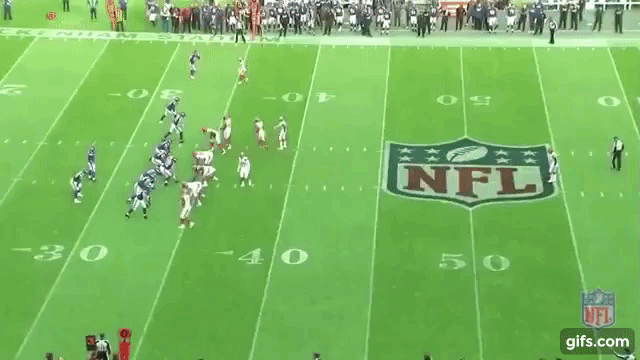
All Diggs has to do is gain a half step on his defender on a shallow crosser, and the first down is his. Keenum goes through his progressions, feels out the five-man rush and delivers an on-time, accurate pass. Easy. With timely ball placement and Keenum’s touch, he can make this pass at least 80 percent of the time, which is exactly his completion percentage in third-and-short situations.
On 3rd-and-2 when defenses chose to stack their linebackers close to the line to prevent runs up the middle, these types of formations can be truly lethal.
Sure, Diggs had a great season last year and is one of the NFL’s best young receivers, but winning such a matchup over the middle is exactly what Emmanuel Sanders can do in this offense. The same could be said of DaeSean Hamilton, who doesn’t have Diggs or Sanders’ speed but can be developed as a route runner to succeed in exactly these types of situations.
Regardless of who the receiver is, in the NFL, your wideouts are supposed to win one-on-one matchups like this one, and with the added depth at receiver, the Broncos will be a lot harder to defend in these types of plays.
Of course, the offense doesn’t need to be complex at all against man. If the outside receivers are seeing single coverage, feeding them on comeback routes — like in this 3rd-and-2 against the Tampa Bay Buccaneers — is the easiest solution of all.
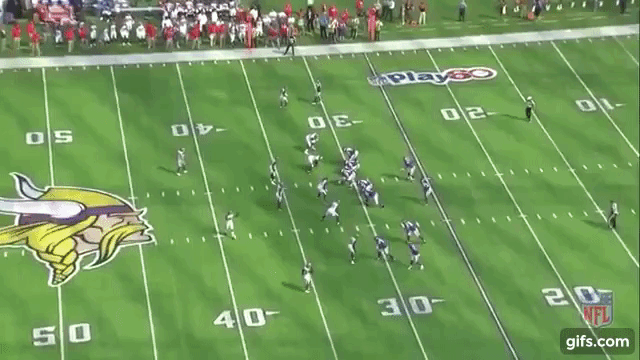
As the Broncos have a lot more size in their receiving core now, winning one-on-one battles outside is going to be very easy with an accurate passer on short throws like Keenum. All Demaryius Thomas or Courtland Sutton have to do is box-out corners outside to win such matchups.
Man-beaters aren’t the only way in which off-balance formations were successful for Keenum’s Vikings last season. Against zones, overloading a zone with three wideouts to one side is a great way to gain an opening for the third-and-short conversions.
Unlike in the first play, where Keenum went towards the three-wide side of the field, here, he targets the opposite side with the single WR.
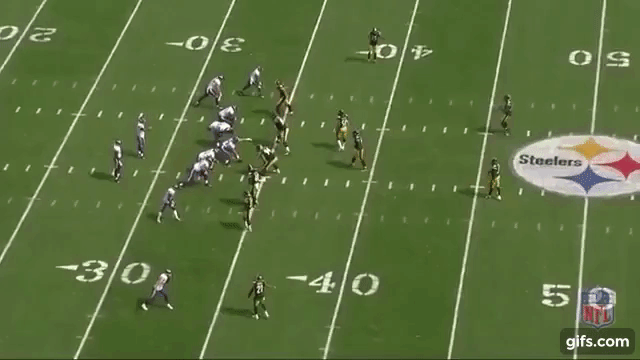
Keenum once again goes through his progressions, looking at the overloaded side first before stepping up and hitting Adam Thielen on a drag-route.
One of the keys to this play is the tailback running a wheel route to the sideline, forcing the outside defenders to stay honest and freeing up space inside for Thielen to get open.
With the added wrinkles we’ve seen in the Vikings offense that helped the Broncos new QB succeed, suddenly, simply doubling Thomas and Sanders outside isn’t all it’ll take to shut down Denver’s offense.
Targeting the RBs
Another way in which the Vikings had a lot of success on third-and-short was by targeting running backs in the passing game.
The play below is a prime example of this, as it’s a very similar route concept to the last zone-beater we looked at against the Pittsburgh Steelers. The big difference is that this time, the outside zone defender follows the receivers inside, opening up space for the running back down the sideline.
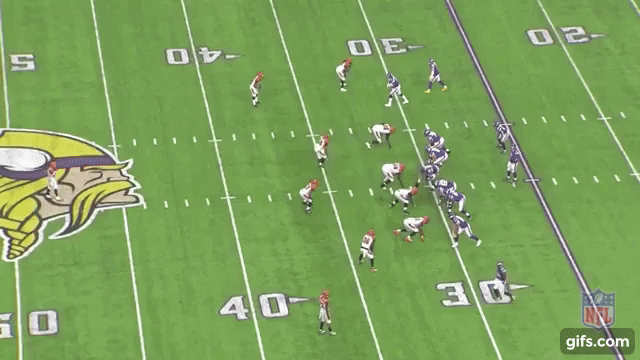
Once that happens, its game over, as Keenum’s too good to not make the correct read and throw the ball to the wide-open back who’s able to break off a huge gain.
The next play is even more simple coming off of a typical play-action bootleg. In this play against the Buccaneers, only three offensive targets run routes, with tight end Kyle Rudolph and Thielen running intermediate-to-deep routes, while running back Dalvin Cook runs a flat route which he turns into another big play off of thrid-and-short.
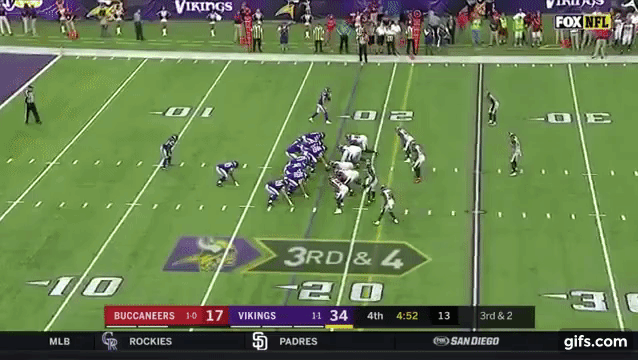
The play-action fake here is a big part of the play working out so well, as it freezes up the linebackers and opens up space for Cook, allowing the play to go for a massive gain. This situation also shows Keenum’s touch and accuracy while throwing on the run with a defender bearing down on him. These are the types of plays in which Denver’s new QB really stands out.
With the receiving skills of Devontae Booker and undrafted free agent Phillip Lindsay, the Broncos have a few different pieces that could be right at home with more passing plays out the backfield on short yardage situations. Booker and Lindsay are also capable of running up the middle, an important factor in this, as their presence in the backfield won’t give away the play.
In conclusion
The comfort Keenum has in passing out of third-and-short should really help the Broncos offense, and the adjustment for Bill Musgrave to adopt these types of plays shouldn’t be too hard, as his offense is also rooted into a west-coast attack.
Keenum might not come with the type of fanfare that a Peyton Manning would rightfully warrant, but he’s a very intriguing QB because of these unique qualities he has to improve a team’s ability in third-and-short situations.
The play concepts above aren’t overly complex, but most of them are fairly genius, especially in obvious running situations. Passing the ball in down-and-distance situations that would suggest a run is coming is something that Musgrave did with great success in Oakland, and you best believe this is something he’s already started to cook up.
There are several more plays that the Broncos could add from the Vikings playbook, but the two concepts of using off-balance formations and passing more to the backs could really put Keenum at ease and allow Denver to turn a weakness into a strength this season.
Comments
Share your thoughts
Join the conversation



